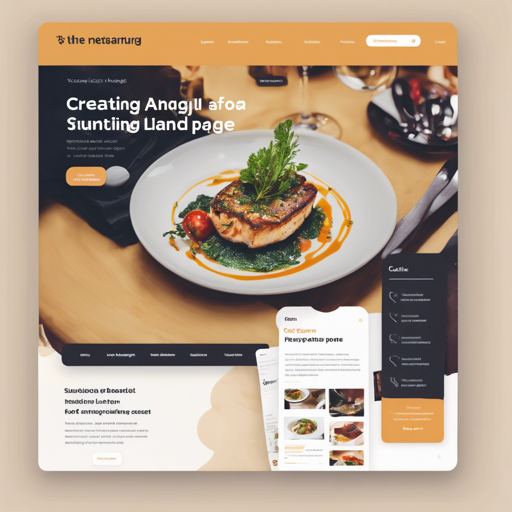Welcome gourmet enthusiasts and aspiring web developers! Today, we are going to take you step-by-step through the process of creating a beautiful, responsive restaurant landing page using Bootstrap and your unique styling. With the tools and methodologies we cover, your restaurant’s online presence will be both visually appealing and user-friendly.
What You Will Need
- Basic knowledge of HTML and CSS
- A text editor (e.g., Visual Studio Code, Sublime Text)
- Bootstrap framework
- An internet connection to access resources and demos
Setting Up Your Environment
Start by setting up your development environment. Here’s how you can do it:
- Download Bootstrap from the official Bootstrap website.
- Create a new folder for your project.
- Inside this folder, create an
index.htmlfile and astyles.cssfile.
Structuring the HTML
Your landing page will need a solid structure. Consider this as building the frame of a house before adding the beautiful decorations!
Here’s a simple skeleton code your index.html could look like:
Restaurant Landing Page
Welcome to Our Restaurant
Delicious meals await you!
Adding Styles with Bootstrap and Custom CSS
Now that the framework is ready, let’s get into the aesthetics. Bootstrap provides a range of styles, but adding your personal flair is where the magic happens! Think of Bootstrap as your restaurant’s menu, while your CSS is the chef’s secret recipes that make each dish unique.
In styles.css, you can add custom styles like:
header {
background-color: #ff7f50;
text-align: center;
padding: 50px;
color: white;
}
footer {
text-align: center;
margin-top: 20px;
}
Making It Responsive
The key aspect of web design today is ensuring your page looks great on all devices, whether it’s a smartphone, tablet, or desktop. Bootstrap’s grid system allows your layout to adapt seamlessly. It’s like a magician’s cloak that fits any form, enabling flexibility!
Use columns and rows like so:
Our Specialties
Explore our menu.
Reservations
Book your table online!
Preview Your Work
To see your work in action, open index.html in your browser. This way, you can appreciate all the fashion and functionality interwoven into your restaurant’s web page!
Troubleshooting Tips
Even the best chefs sometimes face issues in the kitchen! Here are some common problems you might encounter:
- If your styles are not showing up, check if the path to your
styles.cssfile is correct. - Make sure Bootstrap’s CSS is correctly linked in the head of your document.
- Test your layout on different devices. Use Chrome’s Developer Tools to simulate various screens.
For more insights, updates, or to collaborate on AI development projects, stay connected with fxis.ai.
Conclusion
With the steps outlined above, you are now equipped to build your restaurant landing page using Bootstrap and your custom styles. Remember, just like in cooking, practice will make you perfect. Experiment with different styles and layouts to find what works best for your brand.
At fxis.ai, we believe that such advancements are crucial for the future of AI, as they enable more comprehensive and effective solutions. Our team is continually exploring new methodologies to push the envelope in artificial intelligence, ensuring that our clients benefit from the latest technological innovations.
Now go ahead, stir your creativity into the mix, and serve up a delicious online experience!

